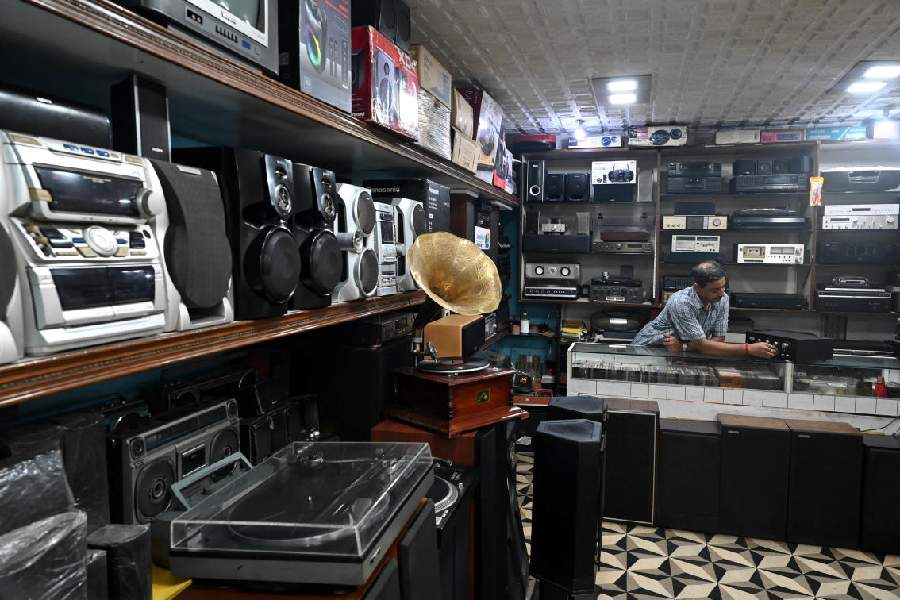In the mid-1990s when I arrived in Calcutta from Purulia, I was overwhelmed by the enormity of the city. I’d wander the streets, gawking at the countless family-owned businesses and shops, amusedly watch the personal relationships shop owners seemed to share with their customers.
There were shops of used books on College Street; paper merchants in the arteries connected to Baithakkhana Market; shops loaded with trophies, shields, medals on Harrison Road…
Most often than not, a lone elderly male would be at the shop counter. In my jousts with friends along Chitpur Road, renamed Rabindra Sarani, I’d see many more such lonely figures. One such was Baidyanath Seal, co-owner of the legendary publishing house, Diamond Library.
He would sit among shelves packed with books on astrology, religious rituals, homoeopathy, sex education, gardening and so on. For anyone who would care to listen, Seal would lament that his sons and grandsons took no interest in the business.
Not all shopkeepers cut a sorry figure though. Prabhakar Gupta in the gaddi of Harish Chandra Gupta & Grandsons, has his shop in a building near Machhuabazar, the wholesale fruit market in central Calcutta.
Gupta is the eighth generation of perfumers, tracing his origin to Kannauj in Uttar Pradesh. The shop, set up in 1818, is packed with khuppis or leather casks full of attars and essential oils. Says Gupta, “Our attars are as good if not better than French perfumes. But we couldn’t learn the art of branding or advertising like them.”
Over the past three decades, hundreds of such places have had to shut shop for a variety of reasons. But some endure, loaded with back stories, a whole old shopping experience. Meet some of these proprietors.
David Chen of Senfo & Co
“Senfo & Co” reads the bright red sign-age on top of the shop on Bentinck Street in central Calcutta. Its tagline is — In Step With You. Unlike most other shoe shops owned by the Indian Chinese,the racks display a great variety of footwear in the latest style, apart from the classic patent leather boots and well-crafted sandals.
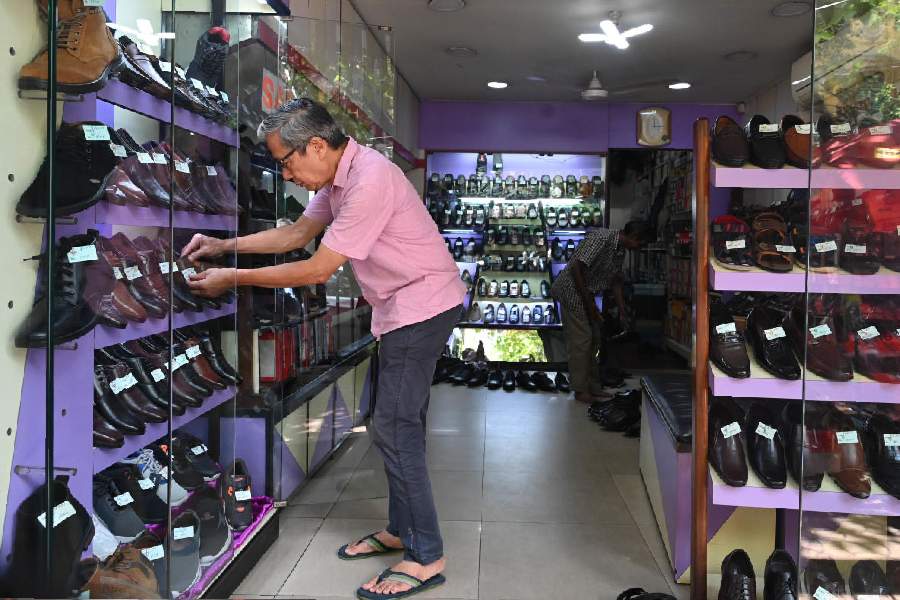
David Chen of Senfo & Co on Bentinck Street.
The owner of the shop is David Chen, 63. His grandfather Fo Shen had opened the shop nearly a century ago and trained all three grandsons to make shoes. Chen remembers a time from the early 1970s when the left flank of Bentinck Street — right from Dha-ramtala crossing to Chitpur — had close to 200 shops owned by the IndianChinese community.
Chen gets bulk orders from Jharkhand, Bangalore and small towns of south India where people take pride in wearing patent leather shoes.
Chen does not seem to have the least bit of regret for having stayed on. On the contrary, he says, “Actually, I am more Indian than most Indians here. And just like most Calcuttans, I take life easy these days, as if I am on an extended vacation.”
Preetam Chakraborty of Metro Music Hall
Before the pandemic struck, you would have spotted him on any weekday afternoon. Clad in dhuti-panjabi and engrossed in repairing an old vinyl turntable or a shellac record player on the ground floor shop of a tumbledown building in central Calcutta. That would be Gopal Chandra Chakraborty, owner of Metro Music Hall and the adjoining dusty workshop on the first floor.
But last summer, Chakraborty did not seem to be around. It took a while to spot his framed picture on the wall, staring fondly at the neat stacks of sound boxes, CD players, amplifiers, black and white television sets, gramophone players. Turned out, he’d passed away and his son Preetam is in charge now.
It is Preetam who tells the story of Metro Music Hall. He says, “My father started his career as a mechanic after our family migrated from East Bengal. In 1962, he bought this shop and started manufacturing gears and machineparts for HMV, the gramophone company. He built a repair workshop on the first floor.” In time he and his two partners became the biggest dealers of vinyl records and even manufactured tele-vision sets.
Preetam is full of hope because he’s been witnessing a “revival of interest” in classical turntable record players and CD players among the youth. Besides, their skilled craftsmen are in high demand among aficionados of classical music.
Naqqi Raja of The Times
This shop is on Waterloo Street or what is today known as Siraj-ud-Daulah Sarani; a 10 feet by 6 feet cubicle lit up with plenty of LED lamps. It stocks a variety of perfumes, deodorants, after-shave lotions and gels, soaps and sundry other male grooming products sourced from various parts of India and even abroad.
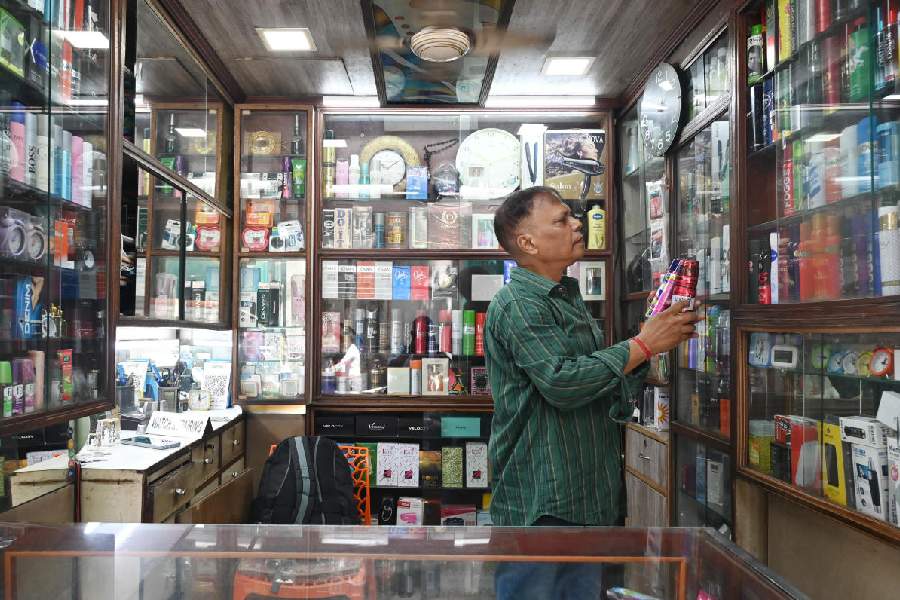
Naqqi Raja of The Times shop on Waterloo Street.
“I started this shop three decades ago after breaking away from our family-owned stationery shop in New Market,” says the 55-year-old. “In the beginning I used to sell watches and clocks,” he says, pointing towards a corner where there are some samples.
A closer look at the counter reveals other useful items, such as a well-crafted magnifying lens and an odd Swiss knife, 10 types of nail clips… About 10 years ago he decided to diversify. As one of his customers puts it: “Naqqi Bhai is so resourceful, he can even source tiger’s milk if asked to.”
Kanai Datta of Time Corner
The sign reading “Time Corner” was written in golden letters. Much of ithas peeled off now. Glass panels have gathered dust and the shelves displaying archaic table timepieces have seen better times. Some of the alarm clocks are from the British era — Ansonias and Smiths. One or two Favre-Leuba Jazs and the Indian brand HES sleep inside glass covers.
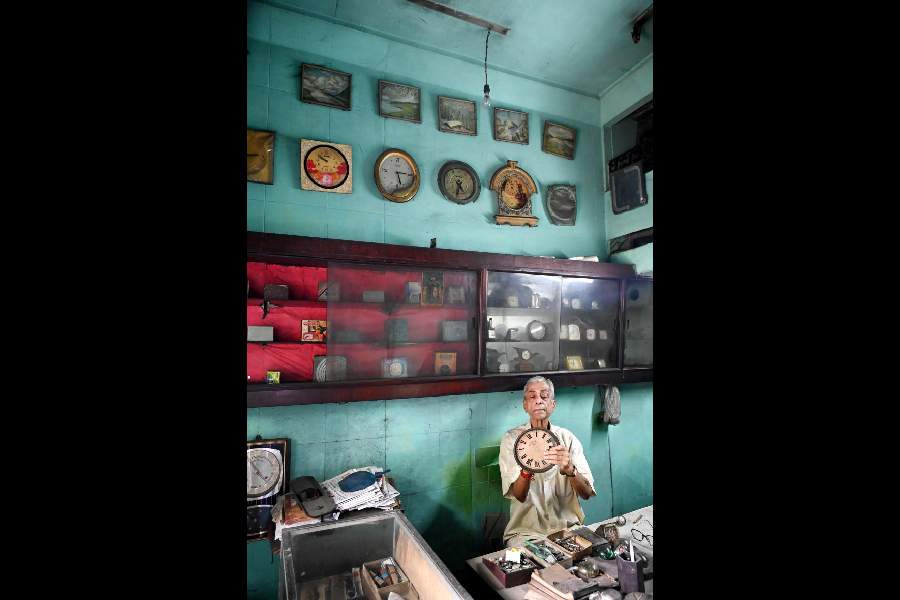
Kanai Datta of Time Corner.
There are grandfather clocks that require winding once a week. The likes of Scientific Rivex and Super Scienti-fic. The frail 80-something shop owner is Kanai Datta, who is also skilled atrepairing ancient clocks. He says, “I too am from the analog era.”
He recalls a time, even three de-cades ago, when he had 14 clocksmiths inhis employ. His uncle Chandra Kumar Datta had started this shop nearly 75 years ago. “I was not even in my teens when I started taking an interest in the innards of clocks.”
After matriculation, he joined full-time as a mechanic and an inheritor of the shop. He says, “I don’t have the means to stock expensive watches. But I do notice some younger people bringing family heirloom clocks to get fixed.”
Abul Haque ofThe Rubber House
There are half a dozen shops on Moti Sil Street of central Calcutta that sell “rubber goods for family planning and surgical items”. The Rubber House is the most nondescript of the lot. The show panel displays cervical collars, kneecaps, abdominal bags and surgeon’s gloves.
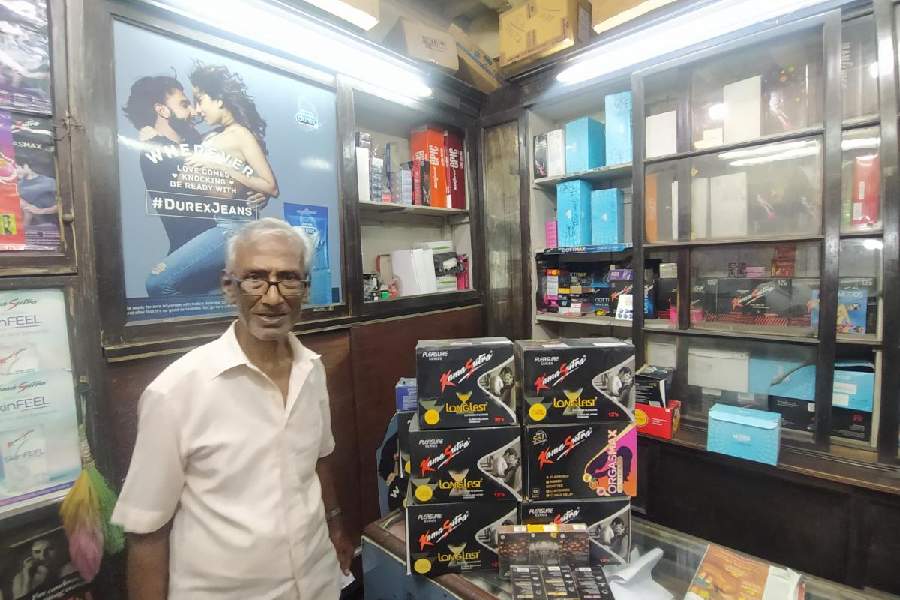
Abul Haque of The Rubber House.
But once you step inside you will figure out that the USP of the shop is male contraceptives, euphemistically termed “rubber goods”. They also stock aphrodisiacs, which they advertise as “ayurvedic medicine for stamina and vitality”. The owner, 82-year-old Abul Haque, is lean, thin and tall. He lives in nearby Taltala and the shop is from the “British era”, according to him.
Haque laments that there was a time people consulted him or his father to sort out family planning issues. According to him, his grandfather had opened the shop to sell surgical goods and it was his father who shifted to selling family planning paraphernalia in the mid-1970s. That was the era when the central government had suddenly enforced population control on people with “nasbandi” or vasectomy and tubal ligation.

